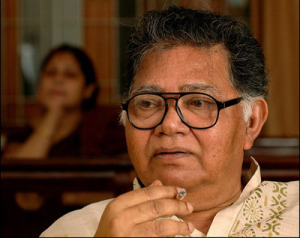The Dhaka Times Desk Sunil Gangopadhyay, the popular poet of two Bengals, is no more. He breathed his last at his bus building in Kolkata at around 2 o'clock yesterday on October 22. He was 78 years old at the time of his death.

Writer Sunil was born on September 7, 1934 in Faridpur, Bangladesh. He moved to Calcutta with his family at the age of four. Graduated from Calcutta University in 1954. In 1958, his first book of poetry 'Eka O Kakhla' and in 1966 his first novel titled 'Atmaprakash' was published.
Sunil Gangopadhyay also wrote under the pseudonyms Nilohit, Sanatan Pathak, Neel Upadhyay. He served as President of India's National Literary Institution Sahitya Akademi and West Bengal Shishu Kishore Akademi.
Notable books written by him are, 'How I am alive', 'Jugalbandi', Suddenly for Neera, Half Life, Aranya Day and Night, Prothom Alo, That Time, East West, Mind Man etc. are notable.
Sunil Gangopadhyay in the struggle for Bengali 'establishment' in West Bengal
Sunil Gangopadhyay was always involved in the movement of Bengali at all levels in West Bengal. The late poet-writer felt that Bengal was seriously neglected at the state level, government and social level. He thought that the cause of Bengal's situation in West Bengal was 'lack of self-respect'. His many speeches and articles on various aspects of Bengali language practice in India have been compiled in the book 'Amra Ki Bangali' published in 2011.
He was at the forefront of the civil movement to ensure the use of Bengali language in Bengali, starting from nameplates of shops and institutions, car number plates to police stations and courts. He directly participated in the program of going to the shops to make the owners aware of this.
Sunil was the author of the claim for the spelling in accordance with the pronunciation of 'Calcutta' instead of Calcutta in English. Anandbazar wrote in the newspaper demanding Bengali language education to be made compulsory in all schools in West Bengal following the Supreme Court order. Although Anandabazar newspaper is hostile to these claims, 'We want Bangla in West Bengal, why Anandabazar's objection?' He has to write essay on this title. In the article 'History Channel in Hindi Why, Bengali is still Sarvamsha', he penned against English language channels dubbed in Hindi.
In 2005, Shahid Smarak Samiti, Navjagaran Manch, Bhasha-Chetna Samiti, these three organizations jointly started a social campaign for the demand of Bengali circulation, which was led by Sunil Gangopadhyay. When Bengali as a provincial language in West Bengal is being weakened by the invasion of Hindi and English, Sunil has said in various articles and speeches that Bangladesh is the place of hope for the survival and development of the Bengali language. Besides, Sunil, who was born in Faridpur in undivided Bengal, also emphasized on the cultural unity of the two Bengals. “The kinship of all Bengalis has never been separated on the basis of language. As long as twenty-five crore Bengalis of the world can be united by the power of language, Bengali language will be considered as one of the major languages of the world", wrote in an article. However, he was also aware of the historical context of the cultural division of the two Bengals.
“What we call a renaissance was led by upper class Hindus a hundred and fifty years ago. They did many good deeds, but also committed a fatal mistake. They did not remember the Muslims at all! Is that man a Bengali or a Muslim – this silly question was heard on the lips of almost all classes of Hindus. (Still goes sometimes).” This fiction writer has written several historical novels in the context of the 'renaissance' of the 19th century.


